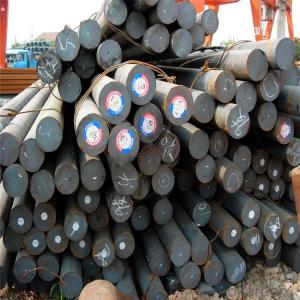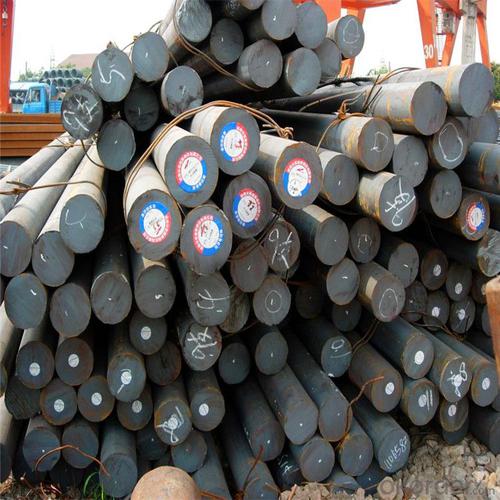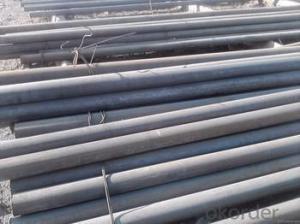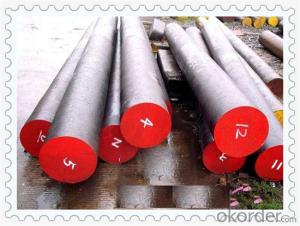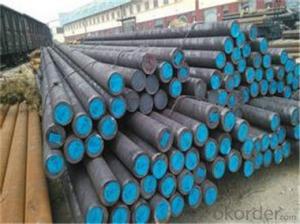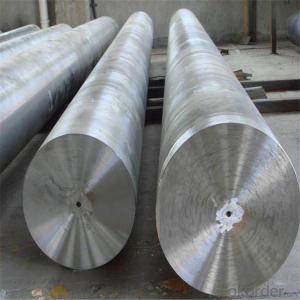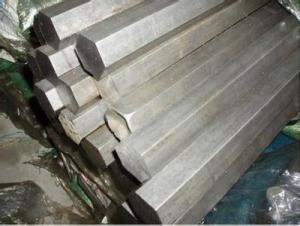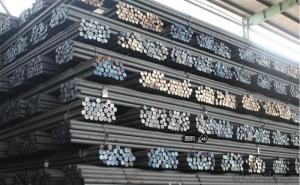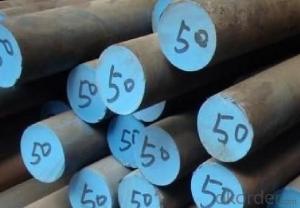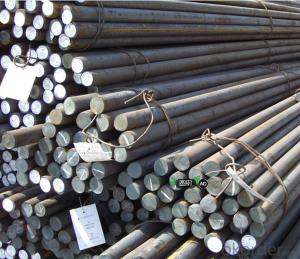Promotional All Sizes S40C Forged Steel Bar
- Loading Port:
- Tianjin
- Payment Terms:
- TT OR LC
- Min Order Qty:
- 100 m.t.
- Supply Capability:
- 500000 m.t./month
OKorder Service Pledge
OKorder Financial Service
You Might Also Like
Specification
Promotional All Sizes S40C Forged Steel Bar
Product Description of Promotional All Sizes S40C Forged Steel Bar
1. Steel grade: SAE1040, 40#, C40, S40C
2. Length: 6M-12M
3. Diameter: 16mm-300mm
4. Product range: round bar, flat bar, square bar
5. Technique: Hot rolled, forged, cold drawn
Specification of Promotional All Sizes S40C Forged Steel Bar
Material | S40C | Round bar | Dia(mm) | 16-300mm |
Process | EAF + LF + VD + Forged + Heat Treatment (optional) | Length (mm) | Max 12m | |
Heat treatment | Normalized / Annealed / Quenched / tempered | Flat bar | Thickness(mm) | 8-500mm |
Delivery condition | Hot forged +Rough machined (black surface after Q/T)+ Turned (optional) | Width(mm) | 70-200mm | |
Test | Ultrasonic test according to SEP 1921-84 D/d | Length (mm) | Max 12m |
Chemical Composition of Promotional All Sizes S40C Forged Steel Bar
C | Si | Mn | Cr | Ni | Cu |
0.37~0.43 | 0.17~0.37 | 0.35~0.65 | ≤0.25 | ≤0.30 | ≤0.25 |
Photo Show of Promotional All Sizes S40C Forged Steel Bar
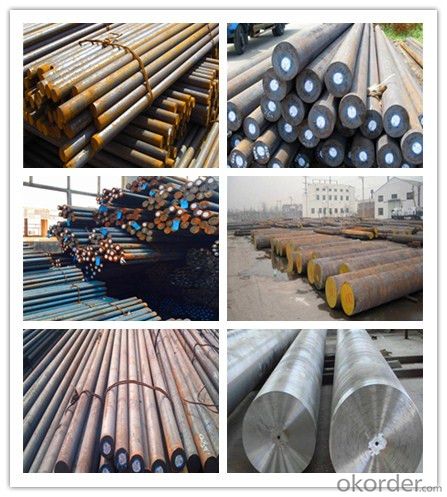
Packing and Delivery:
Packing in bundle package, or as customer's requirements.
Delivery Detail: 45 days after receiving the deposit.
Usage and Applications of Promotional All Sizes S40C Forged Steel Bar
1. Steel round bar is used in a large number of architectural and engineering structures. Or it can be used in construction of plants for the production of steel house frames, high-voltage transmission towers, bridges, vehicles, boilers, containers, ships, etc.
2. And we can use this kind of product on the performance of the mechanical parts if the demand is not very high.
3. Some special material steel round bar can be used for main shaft of steamer, hummer shank, with big section and supper force.
Company Information
CNBM International Corporation is the most important trading platform of CNBM group.
Whith its advantages, CNBM International are mainly concentrate on Cement, Glass, Iron and Steel, Ceramics industries and devotes herself for supplying high qulity series of refractories as well as technical consultancies and logistics solutions.


F A Q
1, Your advantages?
professional products inquiry, products knowledge train (for agents), smooth goods delivery, excellent customer solution proposale
2, Test & Certificate?
SGS test is available, customer inspection before shipping is welcome, third party inspection is no problem
3, Factory or Trading Company?
CNBM is a trading company but we have so many protocol factories and CNBM works as a trading department of these factories. Also CNBM is the holding company of many factories.
4, Payment Terms?
30% TT as deposit and 70% before delivery.
Irrevocable L/C at sight.
5, Trading Terms?
EXW, FOB, CIF, FFR, CNF
6, After-sale Service?
CNBM provides the services and support you need for every step of our cooperation. We're the business partner you can trust.
For any problem, please kindly contact us at any your convenient time.
We'll reply you in our first priority within 24 hours.
- Q: Are square steel, rectangular tube and angle steel shaped or light steel?
- Section steel is a kind of strip steel with definite section shape and size.In accordance with the different smelting quality of steel, steel is divided into ordinary steel and high quality steel. According to the current catalogue of metal products, ordinary steel can be divided into large section steel, medium section steel and small section steel. The section steel can be divided into I-beam, channel steel, angle steel, round steel and so on according to its sectional shape.
- Q: What are the different types of connections used with steel round bars?
- Different types of connections are commonly used with steel round bars, depending on the specific application and structural requirements. Some examples of these connections include: 1. Welded Connections: Steel round bars can be fused together using heat and pressure in a process called welding. This method is widely used and results in a strong and durable connection. 2. Mechanical Connections: Bolts, nuts, or other mechanical fasteners can be employed to join steel round bars together. These connections are easy to install and can be disassembled if necessary, making them ideal for applications requiring frequent disassembly or reconfiguration. 3. Threaded Connections: By cutting threads into the ends of steel round bars, they can be screwed together using nuts. This type of connection offers good strength and can be easily tightened or loosened. 4. Adhesive Connections: High-strength adhesives or epoxies can be used to bond steel round bars together when welding or mechanical connections are not feasible or desirable. This method is commonly used in such situations. 5. Interlocking Connections: Specially designed couplers or connectors can be used to fit over the ends of steel round bars, creating a secure interlocking connection. These connections are often utilized in construction projects where quick and efficient installation is required. 6. Grouted Connections: The gaps between steel round bars can be filled with a cementitious grout material to enhance strength and stability. Grouted connections are commonly used in applications that require high load capacities. To ensure the correct type of connection is chosen for steel round bars, it is crucial to consider factors such as load capacity, installation ease, disassembly requirements, and structural integrity. Consulting with a structural engineer or a professional in the field is recommended.
- Q: What are the different types of steel round bar coatings used in the oil and gas industry?
- Various coatings are commonly utilized in the oil and gas industry to enhance the durability and corrosion resistance of steel round bars. These coatings are essential for protecting the steel from the harsh conditions faced in oil and gas production, transportation, and refining processes. 1. Galvanized Coating: To enhance corrosion resistance, a layer of zinc is applied to the steel round bar through galvanization. This coating effectively safeguards the steel against moisture, chemicals, and exposure to the elements. Galvanized coatings find extensive usage in pipelines, offshore platforms, and storage tanks within the oil and gas industry. 2. Fusion Bonded Epoxy (FBE) Coating: FBE coating involves applying a thermosetting epoxy powder coating to the steel round bar using electrostatic spray. The coating is then fused with heat to form a robust, long-lasting, and corrosion-resistant layer. FBE coatings are widely employed in pipelines, valves, and fittings, providing excellent protection against corrosion, abrasion, and chemicals. 3. Polyethylene (PE) Coating: The application of a polyethylene layer to the steel round bar through extrusion or wrapping methods is known as PE coating. This coating is commonly utilized in oil and gas industry pipelines due to its exceptional resistance to corrosion, chemicals, and impact. Additionally, PE coatings are renowned for their flexibility, enabling the coated bars to withstand ground movement and temperature fluctuations. 4. Polypropylene (PP) Coating: Similar to PE coating, PP coating employs polypropylene instead. PP coatings offer comparable benefits to PE coatings, including corrosion resistance, chemical resistance, and flexibility. They are frequently employed in pipelines within the oil and gas industry, particularly in areas with higher temperatures or where chemical resistance is crucial. 5. Zinc-Nickel Coating: Zinc-nickel coatings involve electroplating a layer of zinc-nickel alloy onto the steel round bar. This coating provides outstanding corrosion protection, even in demanding environments such as offshore installations or high-salinity areas. Zinc-nickel coatings excel in both corrosion and abrasion resistance, making them highly suitable for diverse oil and gas applications. Overall, the utilization of these various steel round bar coatings plays a vital role in preserving the integrity and longevity of equipment and infrastructure in the oil and gas industry. They ensure that the steel bars can endure the challenging conditions encountered during exploration, production, and transportation, thereby reducing maintenance requirements and enhancing safety and reliability.
- Q: Are steel round bars suitable for use in the manufacturing of fittings?
- Yes, steel round bars are suitable for use in the manufacturing of fittings. They have excellent strength and durability properties, making them ideal for creating fittings that require high structural integrity. Additionally, steel round bars can be easily machined and welded, allowing for precise and efficient manufacturing processes.
- Q: What is the maximum vanadium content allowed for steel round bars?
- The allowed vanadium content in steel round bars varies depending on the specific steel grade and industry standards, with different regulations or customer requirements for different steel grades and applications. Vanadium is commonly used as an alloying element in steel to enhance its strength, hardness, and corrosion resistance. Generally, the maximum vanadium content in steel round bars falls between 0.02% and 0.25%. To determine the maximum allowed vanadium content for steel round bars, it is essential to consult the relevant standards and specifications for the specific steel grade and application.
- Q: Are steel round bars suitable for bicycle frame applications?
- Yes, steel round bars are suitable for bicycle frame applications. Steel is a commonly used material for bicycle frames due to its strength, durability, and ability to absorb vibrations. Round bars provide a strong and rigid structure, allowing for a stable and reliable frame that can withstand the stresses and strains of regular use.
- Q: Can steel round bars be recycled?
- Yes, steel round bars can be recycled. Steel is a highly recyclable material, and the recycling process involves melting the steel bars down to be used in the production of new steel products.
- Q: Can steel round bars be used for making suspension springs?
- Yes, steel round bars can be used for making suspension springs. Steel is a commonly used material for suspension springs due to its high strength and durability. The round bars can be forged or shaped into the desired spring shape and then heat-treated to achieve the desired spring characteristics. Additionally, steel round bars can be easily machined and drilled to accommodate different suspension systems and components. However, it is important to consider the specific requirements and load capacity of the suspension system to ensure that the chosen steel round bars are suitable for the intended application.
- Q: What are the different types of steel round bars used in the manufacturing of bearings?
- The manufacturing of bearings involves the use of various types of steel round bars. The choice of steel depends on factors like the application, load capacity, and desired performance of the bearing. One popular option is through-hardened steel, which undergoes heat treatment to achieve consistent hardness throughout the bar. These round bars offer excellent strength and wear resistance, making them suitable for heavy-duty bearing applications. Another commonly used steel is case-hardened steel. In this case, the surface is hardened while the core remains relatively soft. This combination provides high surface hardness for wear resistance, as well as improved toughness and impact resistance. Stainless steel is another steel type utilized in bearing production, especially in environments where corrosion resistance is required. Stainless steel round bars have exceptional resistance to rust and corrosion, making them ideal for marine or chemical industries. Additionally, alloy steel round bars are commonly employed in bearing manufacturing. These steels are created by adding alloying elements like chromium, molybdenum, or nickel to enhance specific properties such as hardness, toughness, or heat resistance. Alloy steel round bars are often used in specialized bearing applications that require exceptional performance under high temperatures or extreme conditions. To summarize, the manufacturing of bearings involves different types of steel round bars, including through-hardened steel, case-hardened steel, stainless steel, and alloy steel. Each type offers unique properties and characteristics that make them suitable for specific bearing applications.
- Q: Can steel round bars be used in the production of machinery?
- Yes, steel round bars can be used in the production of machinery. Steel round bars are commonly used in the manufacturing industry for various applications, including the production of machinery. The high strength and durability of steel make it an ideal material for constructing machine components that require strength and rigidity. Steel round bars can be machined, shaped, and welded to create different parts such as shafts, gears, axles, and structural components in machinery. The use of steel round bars ensures the reliability and longevity of the machinery, making it a preferred choice in many industries.
Send your message to us
Promotional All Sizes S40C Forged Steel Bar
- Loading Port:
- Tianjin
- Payment Terms:
- TT OR LC
- Min Order Qty:
- 100 m.t.
- Supply Capability:
- 500000 m.t./month
OKorder Service Pledge
OKorder Financial Service
Similar products
Hot products
Hot Searches
Related keywords
